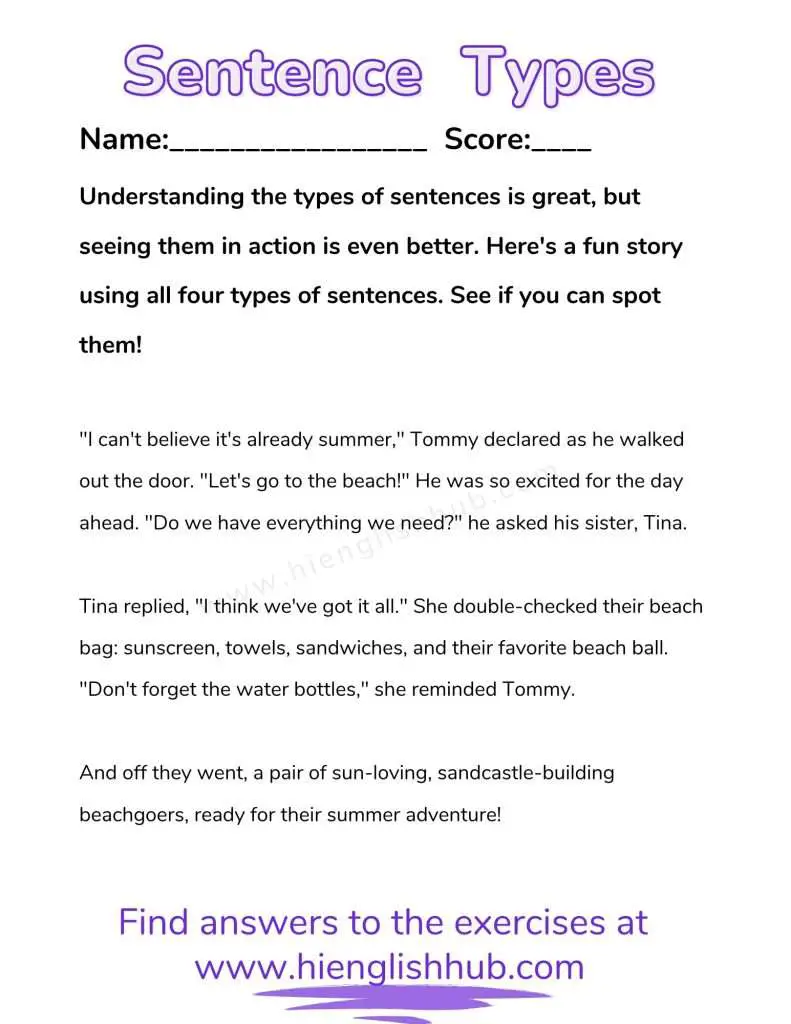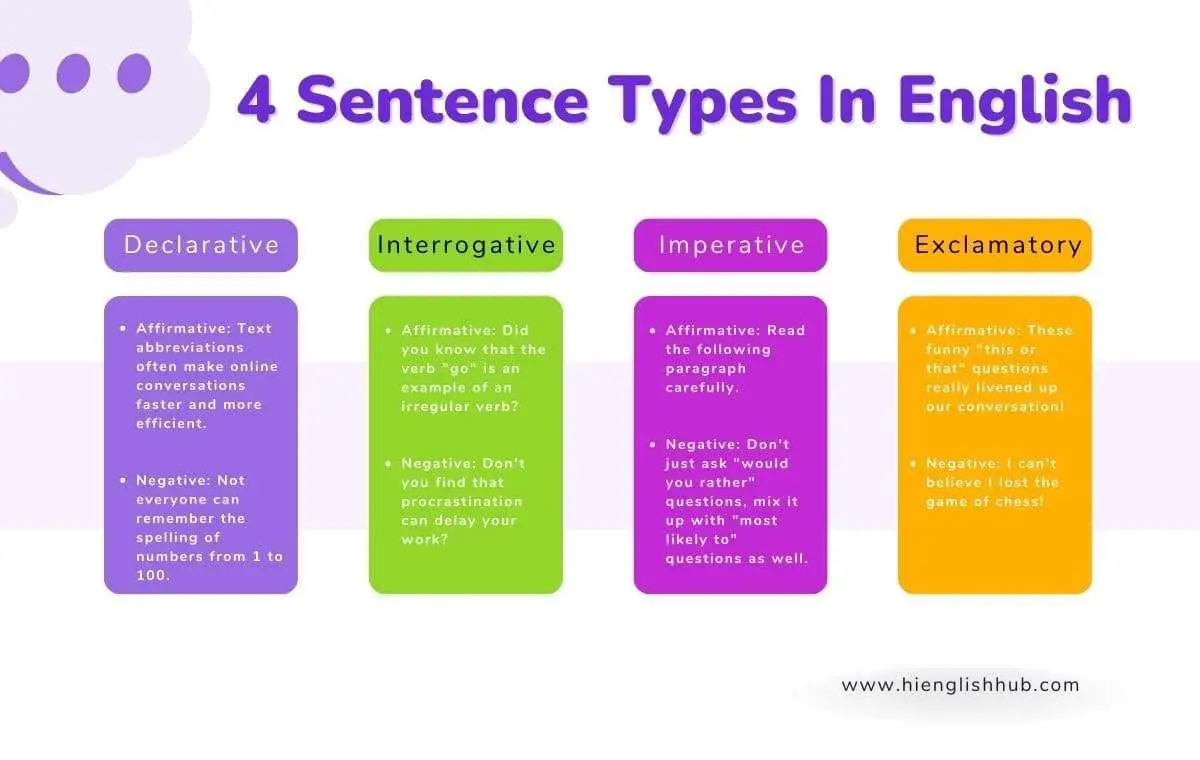Ever wondered how we can easily share our thoughts, ask questions, or express strong feelings?
It’s all thanks to different types of sentences in English!
In this blog post, we’ll explore the four main types: Declarative, Interrogative, Imperative, and Exclamatory.
Knowing these isn’t just for grammar nerds—it’s about becoming a super communicator.
So, are you ready to learn and have some fun? Let’s dive in!
What Are Sentence Types?
In English, we use four main types of sentences: declarative, interrogative, imperative, and exclamatory.
Think of these like the ingredients in your favorite sandwich. Just like you might have bread, cheese, lettuce, and ham, you have these four sentence types.
Let’s break down each one.
| Sentence Type | Description | Ending Punctuation | Example |
|---|---|---|---|
| Declarative | These sentences declare or state something. They can be positive or negative. | Period (.) | I enjoy playing the truth or dare game. |
| Interrogative | These sentences are used when you have a question. | Question Mark (?) | Do you want to join the truth or dare game? |
| Imperative | These are the “bossy” sentences. They give commands or make requests. | Period (.) or Exclamation Point (!) | Please start the truth or dare game. |
| Exclamatory | These sentences express strong emotion or surprise. | Exclamation Mark (!) | What a daring dare in the game! |
Sentence Types Examples
Let’s take a look at some examples of each sentence type in action:
Declarative (Assertive) Sentence
- Affirmative: Text abbreviations often make online conversations faster and more efficient.
- Negative: Some people cannot recall the spelling of numbers from 1 to 100.
Interrogative Sentence
- Affirmative: Did you know that the verb “go” is an example of an irregular verb?
- Negative: Don’t you find that procrastination can delay your work?
Imperative Sentence
- Affirmative: Read the following paragraph carefully.
- Negative: Don’t just ask “would you rather” questions, mix it up with “most likely to” questions as well.
Exclamatory Sentence
- Affirmative: These funny “this or that” questions really livened up our conversation!
- Negative: I can’t believe I lost the game of chess!
Sentence Types Worksheet

Understanding the types of sentences is great, but seeing them in action is even better. Here’s a fun story using all four types of sentences. See if you can spot them!
“I can’t believe it’s already summer,” Tommy declared as he walked out the door. “Let’s go to the beach!” He was so excited for the day ahead. “Do we have everything we need?” he asked his sister, Tina.
Tina replied, “I think we’ve got it all.” She double-checked their beach bag: sunscreen, towels, sandwiches, and their favorite beach ball. “Don’t forget the water bottles,” she reminded Tommy.
And off they went, a pair of sun-loving, sandcastle-building beachgoers, ready for their summer adventure!
Ready for the answers? Here they are:
- “I can’t believe it’s already summer,” Tommy declared as he walked out the door.—This is an exclamatory sentence because it expresses a strong emotion of surprise.
- “Let’s go to the beach!”—This is an imperative sentence because it’s giving a command or making a suggestion.
- “Do we have everything we need?” he asked his sister, Tina.—This is an interrogative sentence because it’s asking a question.
- “I think we’ve got it all.”—This is a declarative sentence because it’s making a statement or expressing an opinion.
- “Don’t forget the water bottles,” she reminded Tommy.—This is an imperative sentence because it’s giving a command or direction.
- “And off they went, a pair of sun-loving, sandcastle-building beachgoers, ready for their summer adventure!”—This is a declarative sentence because it’s stating a fact or describing a situation.
So, in this story, we’ve seen all four types of sentences: declarative, interrogative, imperative, and exclamatory. Can you see how each one adds a different flavor to the story, just like different ingredients in a recipe?
FAQs On Sentence Types
What Is the Difference Between Assertive And Affirmative?
While both these terms refer to certain kinds of statements, they are used in different contexts.
An assertive sentence, also known as a declarative sentence, is a sentence that states a fact or an opinion and expresses a complete thought. Assertive sentences can be either positive or negative. For example:
– The cat is on the roof. (Positive)
– I do not like 70% cocoa dark chocolate bars. (Negative)
On the other hand, affirmative is a term that specifically describes a positive statement. Affirmative sentences are often contrasted with negative sentences.
– I like ice cream. (Affirmative)
– I do not like ice cream. (Negative)
So, in essence, an assertive sentence can be either affirmative or negative, but an affirmative sentence is always assertive because it states a fact or opinion.
What Is an Affirmative Sentence?
An affirmative sentence is one that states a fact or agreement, expresses a positive belief, or confirms something as true.
They’re the “yes” to negativity’s “no.” An affirmative sentence can be as simple as a single positive word like “Yes” or “Agreed,” but usually, it’s a complete sentence that declares something to be true. Here are a few examples:
The sky is blue.
Dogs make great pets.
I can swim.
These sentences all state positive facts or beliefs, which is why we call them “affirmative.”
wrapping Up
So, there we have it—four types of sentences that make our chats, tales, and arguments come alive. By using declarative, interrogative, imperative, and exclamatory sentences, you’ll not just get better at English, but you’ll also become a pro at expressing yourself.
Now that you’re equipped with this knowledge, it’s your turn to use it!
Practice these sentence types in your daily life, challenge yourself to use them in different contexts, and watch your communication skills reach new heights.
If you found this information beneficial, feel free to share it with your friends, colleagues, or anyone you know who loves language and is eager to learn more. Not only will you help them improve their communication skills, but you’ll also contribute to a broader appreciation of the intricacies of our language.
So go ahead, hit the share button, and let’s spread the love for English far and wide!


